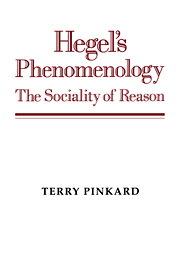Book contents
- Frontmatter
- Contents
- Acknowledgments
- Hegel's Phenomenology
- 1 Why the Phenomenology of Spirit?
- 2 The claims to self-sufficient knowledge: sense-certainty, perception, understanding
- 3 The claims of self-sufficient agency: freedom and self-consciousness
- 4 Modern life's project of self-justification
- 5 Modern life's alternatives and modern life's possibilities
- 6 The self-reflection of the human community
- 7 The essential structure of modern life
- Notes
- Works cited
- Index
7 - The essential structure of modern life
Published online by Cambridge University Press: 05 September 2014
- Frontmatter
- Contents
- Acknowledgments
- Hegel's Phenomenology
- 1 Why the Phenomenology of Spirit?
- 2 The claims to self-sufficient knowledge: sense-certainty, perception, understanding
- 3 The claims of self-sufficient agency: freedom and self-consciousness
- 4 Modern life's project of self-justification
- 5 Modern life's alternatives and modern life's possibilities
- 6 The self-reflection of the human community
- 7 The essential structure of modern life
- Notes
- Works cited
- Index
Summary
The post-phenomenological project
After the Phenomenology, Hegel began to work out what was later to become known as “the system,” articulated in his Encyclopedia of the Philosophical Sciences (originally published in his Heidelberg years in 1817) and expanded in his lectures in Berlin from his arrival there in 1818 to his death there in 1831. During this period after the writing of the Phenomenology and the construction of the “system,” Hegel apparently came to think that it was possible to say more about the structure of this modern community within the dialectical terms he had set for himself. The Phenomenology ends with the statement of the modern project: the creation of a reconciled community that would unite the intellectual project of modern life – the attempt to create a self-founding form of life – with the practical project of modern life, the attempt to create a form of life of self-determining individuals. However, in the Phenomenology, this remains as a project, for there is no theory offered there of which practices or institutions could accomplish it.
Among the kinds of watershed events in the European community's history that the Phenomenology had located, the most consequential for the post-phenomenological project was the sense of “groundlessness” in the European community after the decline of the aristocratic ethos.
- Type
- Chapter
- Information
- Hegel's PhenomenologyThe Sociality of Reason, pp. 269 - 344Publisher: Cambridge University PressPrint publication year: 1994



